2016 Annual Report for LNE15-343
Improving nutrient and pest management in high tunnel tomato production
Summary
High tunnel production is economically critical to Northeastern vegetable growers, and tunnel production area is increasing rapidly. Our project provides a comprehensive approach to help growers manage tunnel ecosystems through a multi-faceted education program, supported by research on significant production challenges: management of soil fertility and arthropod pests.
Our goal is to help growers improve their crop production by adopting the following practices: 1) monitor pest populations and soil fertility in high tunnels; 2) accurately identify pests, disorders and nutrient deficiencies; and 3) follow revised soil nutrient and pest management strategies. This will lead to tunnel crops that are better managed to produce high yields of quality crops while reducing production costs and negative environmental impacts.
The educational component addresses tunnel production issues broadly. Growers tell us they learn and adopt new practices more readily by hearing from fellow growers. Therefore we will facilitate exchange among growers by establishing communication networks and involving growers in training and educational events. The education portion of this project complements our research activities, and incorporates research results as they become available, but is not dependent on the results.
Objectives/Performance Targets
Objectives: Our educational approach will include two grower conferences that address tunnel production practices, including nutrient and pest management. Six growers will cooperate in participatory on-farm research/demonstration programs, working with the project team to develop, assess, and demonstrate customized biocontrol and nutrient management plans for their production systems. Tunnel production topics will be presented at workshops and twilight meetings, and through published and electronic approaches. With input from our grower advisory group, we will develop grower-friendly resources, e.g. videos, webinars and factsheets demonstrating IPM techniques, a website on tunnel tomato production and our research results, and new ways for growers to network and exchange information.
Our two main research objectives for tunnel tomato production are: 1) identify soil test critical levels for nitrogen (N) and potassium (K), and calibrate common soil tests under tunnel conditions to determine appropriate methods for predicting nutrient availability; and 2) demonstrate the efficacy of habitat plants to increase biodiversity and reduce pest problems. Trials will be conducted in University-managed production-scale high tunnels in NH and ME, which will also serve as educational workshop locations.
Performance Target: Over 150 growers (covering >15 acres) will improve soil fertility and pest management in high tunnel tomatoes, resulting in 75 producers increasing their annual crop revenues by an average of $1000 per farm, and 75 producers reducing pesticide use by at least one application per year.
Accomplishments/Milestones
Work on the project was slightly delayed because of a delay in receiving funds. Despite this, we have made good progress on our project milestones. Year 1 progress is described below each milestone.
- 600 growers receive a survey about their current high tunnel fertilization and pest management practices and challenges; 100 return it. Results are used to develop conference programs. Fall 2015.
In Spring 2016, in collaboration with our Grower Advisory Committee, we designed a high tunnel survey with the goals of 1) establishing baseline data on pest and nutrient management practices in Northern New England high tunnels, and 2) identifying grower priorities for educational resources. This survey was disseminated throughout Maine, New Hampshire and Vermont to over 1000 vegetable, berry, and greenhouse/ornamental producers. Of 110 survey respondents, 95 reported growing crops in high tunnels. The survey covered 311 tunnels, covering an estimated 15.7 acres, throughout Northern New England. Results of the survey were summarized in Summer/Fall 2016. The draft report is available here.
- 6 growers serve as on-farm research/demonstration cooperators, working with project staff to develop and implement individualized production plans to address their specific pest/nutrient management challenges. All will agree to take part in pre- and post-production evaluations, complete a crop record form annually and serve as regional demonstration sites. Winter 2016.
The project team has solicited input from interested participants, and currently has a pool of over 30 interested growers. We are currently screening these participants to identify and select cooperators. Work will begin in Winter 2017.
- 150 growers attend 2016 Tunnel Tomato Conference, and learn about IPM, soil management, and general crop production practices. Winter 2016.
This conference took place on 14 December 2016. Because of room limitations, we had to limit the number of participants. 112 participants from NH, ME, VT, MA, CT and NY attended. The Conference flier is attached, as are the results from our Conference Evaluation.
- 200 growers attend educational events in ME, VT and NH (demonstrations, workshops, twilight meetings, webinars, etc.) and learn about soil testing, biocontrol and other tunnel production subjects. Summer 2016 – Winter 2018.
The following educational events were held as a part of this project. The total number of participants in ME, VT and NH were 460 growers, 87 agricultural professionals, and 25 master gardeners. In the mid-Atlantic region, another 275 growers participated in three of these events.
In Chronological Order:
Sullivan, C. & L. King. Jan. 2016. Habitat Plants for IPM in Vegetable High Tunnels and Greenhouse Ornamentals. How to make Habitat Plants work for you. Greenhouse IPM Workshop, Manchester, ME. (45 growers)
Sullivan, C. & L. King. Jan. 2016. Habitat Plants for IPM in Vegetable High Tunnels and Greenhouse Ornamentals. How to make Habitat Plants work for you. Greenhouse IPM Workshop, Durham, NH. (40 growers)
Sullivan, C. & L. King. Jan. 2016. Habitat Plants for IPM in Vegetable High Tunnels and Greenhouse Ornamentals. How to make Habitat Plants work for you. Greenhouse IPM Workshop Burlington, VT. (40 growers)
Eaton, C. & B. Sideman. Feb 3, 2016. Managing Soil Fertility in High Tunnel Tomato Production. Certified Crop Advisors’ Workshop, Portsmouth NH (75 agricultural professionals)
Skinner, M., C. F. Sullivan, E. Sanchez, K. Ayers, M. Hutton & J. Lilley. Feb 2-4, 2016. Using Biocontrols for Insect Pests in High Tunnels. Mid-Atlantic Fruit & Vegetable Con., Hershey, PA. (100 growers)
Skinner, M. & K. Demchak. Feb 3, 2016. Thrips Galore, and we don’t want more! Discussion of a Raspberry Pest. Mid-Atlantic Fruit & Vegetable Con., Hershey, PA. (100 growers)
Skinner, M., C. F. Sullivan, E. Sanchez, K. Ayers, M. Hutton & J. Lilley. Feb 2, 2016. Common Natural Enemies in High Tunnels. Mid-Atlantic Fruit & Vegetable Con., Hershey, PA. (75 growers).
Hutton, M.. Mar 15, 2016. High tunnel tomato nutrient management research, Maine Vegetable School. Portland, ME (85 growers).
Hutton, M. Mar 16, 2016. High tunnel tomato nutrient management research. Maine Vegetable School. Bangor, ME (75 growers).
Hoskins. Mar 16, 2016. Soil Fertility Mgt in High Tunnels for NRCS New Farmer Series in Union ME. (30 growers).
Sullivan, C. & M. Skinner. Mar. 24, 2016. Promoting the Establishment of Aphid Natural Enemies in High Tunnels. (5 growers, 5 agricultural professionals).
Sideman. May 24, 2016. Section within Apprentice Short Course on high tunnel pests and diseases. (25 growers)
Sullivan, C. Frank & M. Skinner. Jun 17, 2016. Sampling & Id of Aphids & Their Natural Enemies in High Tunnels. SARE High Tunnel Collaborator Training Session. Univ. of VT, Burlington, VT. (12 agricultural professionals – see photos below.)
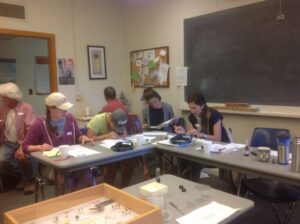 SARE project collaborators learn how to identify aphids.
SARE project collaborators learn how to identify aphids. 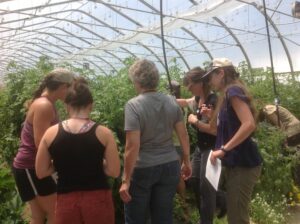 SARE project collaborators visit a high tunnel to identify pests and natural enemies.
SARE project collaborators visit a high tunnel to identify pests and natural enemies.
Hutton, M. July 12, 2016. High Tunnel Nutrient Management Research. Twilight Meeting, Highmoor Farm, Monmouth ME. (35 growers)
Sideman, E. July 14, 2016. High Tunnel Q&A at Twilight Meeting. Black Kettle Farm, Lyman ME. (15 growers)
Hoskins, B. Aug 16, 2016. Soil Fertility Mgt in High Tunnels. Training webinar for Maryland NRCS on August 16, 2016. It was carried live to an unknown number of attendees.
Bryant, B. Sideman & E. Sideman. Aug 29, 2016. High Tunnel Q&A at Vegetable Growers’ Twilight Meeting. Pork Hill Farm, Ossipee, NH. (19 growers)
Hutton, M. Sept 21, 2016. High Tunnel Nutrient Management Research. Twilight Meeting, Highmoor Farm, Monmouth ME. (40 growers)
Sideman, B. Sept 22, 2016. High tunnel production systems and habitat plants for biocontrol. Tour and presentation to Master Gardeners, Woodman Farm, Durham NH. (25 master gardeners)
Sideman, E. Nov 6, 2016. Presentation at MOFGA’s Farmer to Farmer Conference: Fundamentals of Tomato Growing, Especially in High Tunnels. Northport, ME. (25 growers)
- 150 vegetable growers report in evaluations that they implemented one or more new practices learned at a project educational event, in their tunnels. Summer 2016-Winter 2018.
82% of the attendees who completed an evaluation for the Tri-State (VT, ME and NH) Greenhouse IPM workshops in used biological control last year, compared to 70% in 2015: ME: 81%; NH: 69%; VT: 96%. Of those who used biological control, 84% used predators; 69% nematodes, 65% parasites, 45% insect killing fungi, 39% disease killing microbes (soil treatments) and 28% insect-killing bacteria.
60% of the growers who completed an evaluation for the Tri-State (VT, ME and NH) greenhouse IPM workshops indicated they used some form of a plant-mediated IPM system last year (81% of ME growers, 22% of NH growers and 78% of VT growers), including aphid banker plants, assorted trap/indicator plants (marigolds, eggplants and peppers).
82% of the growers who completed an evaluation for the High Tunnel Conference in Dec 2016 said that they planned to make one or more changes based on what they learned at the conference. Implementation of actual changes will need to be evaluated in the future.
Extrapolating to all conference attendees, we can estimate that 15 growers newly adopted IPM based on our outreach efforts, and that 76 growers used plant-mediated IPM systems. Further, 90 producers planned to adopt new practices based on what was learned at the high tunnel conference.
- 500 growers learn about habitat plants, pest management and crop nutrition recommendations through the Tunnel Tomato Website, printed handouts, or web-based training produced by project personnel. Winter 2018.
We have begun work on this milestone, primarily in developing and populating project web pages, as follows:
Project partners established a high tunnel pest management page on the UVM Entomology Research Laboratory website to enhance and expand current greenhouse IPM page. This page logged 862 hits on the UVM greenhouse and high tunnel pest management pages from Nov 2015 – Nov. 2016.
Project partners also established the Tunnel Tomato Website specific to this project, as mentioned above () in Summer 2016. While still not completely populated, hits have increased considerably since posting all of the powerpoints from the December 2016 High Tunnel Conference. This page logged 180 views by 59 visitors from June 2016 (inception) – December 2016.
Work towards the following milestones has not yet begun:
- 150 growers attend 2018 Tunnel Tomato Conference and learn about IPM, soil management, and crop production practices, including recent research results. Winter 2018.
- 6 growers who serve as farmer-cooperators adopt one or more new production practices learned through this project in their tunnels.
- 600 growers receive final follow-up survey and evaluation about their current tunnel fertilization and pest management practices; 100 return it. Data will be compiled to assess project impact. Fall 2018.
- 150 growers adopt new practices learned through this project and 1) increase gross revenue from their tunnels, and/or 2) reduce pesticide use by at least one application per year. Fall 2018.
Impacts and Contributions/Outcomes
IPM Research. The high tunnel survey revealed aphids as one of the top insect pests that plague high tunnel growers with few reaping the benefits that habitat plants have to offer to promote the establishment of aphid natural enemies.
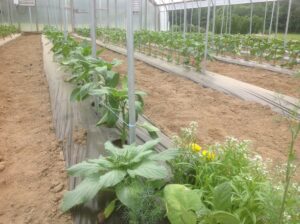 A young habitat plant system, installed in a high tunnel full of peppers in Durham, NH
A young habitat plant system, installed in a high tunnel full of peppers in Durham, NH
Guidelines for the integration of plant-mediated IPM systems into high tunnel production were developed and tested across 2 states (ME & NH). Habitat plant systems containing borage, alyssum, bean, marigold and dill were installed at 4 locations (1 ME, 3 NH) to determine if including these systems in high tunnel production increased the presence of naturally-occurring aphid natural enemies.
Scouting protocols for summer high tunnel crops (tomatoes, peppers) and habitat plant systems were developed to detect aphids and their natural enemies. Routine scouting was performed bi-weekly throughout the summer-early fall of 2016 by personnel trained though a one-day program tailored specifically to this project.
An intensive one-day training program was conducted, attended by 15 University personnel and grower collaborators. It focused on the identification of aphids and other high tunnel pests and their associated natural enemies (wild and released), the development of comprehensive scouting programs and IPM programs tailored to specific cropping systems within high tunnels.
Data from year 1 are currently being compiled and analyzed to prepare a summary handout for distribution to growers, researchers, Extension specialists and State Dept. of Agriculture personnel via our website and during upcoming Tri-State Greenhouse IPM Workshops which will be held in ME, NH and VT as well as at other outreach events that will occur in the coming year.
Preliminary results for year 1 show over 750 individual natural enemies were observed on habitat plant systems. Overall, the average percentage of common natural enemies visiting these systems were as follows: 48% syrphid fly adults, 32% parasitic wasps and mummies (parasitized aphids), 8% lady beetles (various life stages), 6% predatory fly maggots (syrphids and others), 5% Orius adults and nymphs (predatory bug) and 2% lacewings (various life stages). When the number of all natural enemies observed was combined, more were found on borage (52%) than alyssum (30%), dill (13%) or marigold. Common pests observed on habitat plants included aphids, thrips, spider mites and flea beetles.
Soil Fertility Research. Prior to the start of this project, preliminary work had been conducted in three sites (Durham NH, Monmouth ME and North Haverhill NH). This preliminary work was partially supported by SARE graduate student grant GNE14-077, and by a grant from the Maine Agricultural Center.
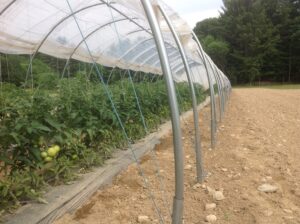 Potassium fertility experiment in high tunnel tomatoes grown in Durham, NH in 2016, early in the growing season.
Potassium fertility experiment in high tunnel tomatoes grown in Durham, NH in 2016, early in the growing season.
Building on that preliminary work, in year 1 we conducted an additional set of experiments in all three sites to verify potassium needs for high tunnel tomato, using six levels of potassium ranging from 0-900 lbs/acre, at a single moderate rate of nitrogen; with four replicates.
There were minor modifications to the experimental protocol, taking into account earlier results and to increase the likelihood of obtaining meaningful results. Tomatoes were grown using standard practices for the region. Soil samples were taken from each plot at three times: before adding amendments, at first harvest, and just after final harvest, and soil analysis (SME and Modified Morgan) is still underway for these samples. Whole leaves were collected twice (mid-bloom first and fifth cluster) for nutrient status evaluation (currently underway). Marketable and total fruit yield data were collected weekly; fruit size and any defects/disorders (cracking, uneven ripening, internal white tissue, yellow shoulder, etc.) were also assessed at each harvest.
Data from year 1 are currently being compiled and analyzed to prepare a summary handout for distribution to growers, researchers, Extension specialists and State Dept. of Agriculture personnel via our website and during upcoming educational events, and for use in refining experimental plans for subsequent years.
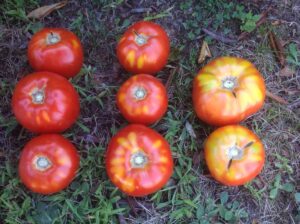 Several degrees of yellow shoulder, ranging from very mild (L) to severe (R).
Several degrees of yellow shoulder, ranging from very mild (L) to severe (R).
Our preliminary results suggest new information regarding potassium fertility in high tunnels. Based on very large decreases in soil K levels at even the highest K application rates, tomato may be a luxury consumer of potassium. It also appears that there was, as we hypothesized, a strong relationship between K application rate, soil K levels, and marketable yields, as well as the disorder yellow shoulder.
Soil testing. In our roles affiliated with state soil testing labs, we continue to conduct high tunnel soil tests and issue local recommendations for high tunnel soils. The UMaine Analytical Lab performed approximately 330 high tunnel soil tests in ME and VT; and 1 from NH. The UNH Soil Testing Service issued recommendations for 68 high tunnel soil tests in NH. In addition to these, UMaine issued 40 more high tunnel soil tests outside of Northern New England. These provide good baseline data, as well as an indication that growers are already recognizing the value of high tunnel soil testing as a nutrient management tool.
Collaborators:
Extension Associate Professor
University of Maine
PO Box 179
Monmouth, ME 04259-0179
Office Phone: 2079332100
Extension Field Specialist
University of New Hampshire
3855 Dartmouth College Highway, Box 5
North Haverhill, NH 03774-4909
Office Phone: 6037876944
Crops Specialist
Maine Organic Farmers & Gardeners Association
120 Perry Road
Strafford, NH 03884
Office Phone: 6032696201
University of Vermont
Entomology Research Laboratory, 661 Spear St.
Burlington, VT 05405
Office Phone: 8026565440
Coordinator, Soil Testing Program
University of Maine
722 Deering Hall Rm 409 A
Orono, ME 04469
Office Phone: 2075812945
Director, Soil Testing Laboratory
Pennsylvania State University
Tower Road
University Park, PA 16802
Office Phone: 8148630841